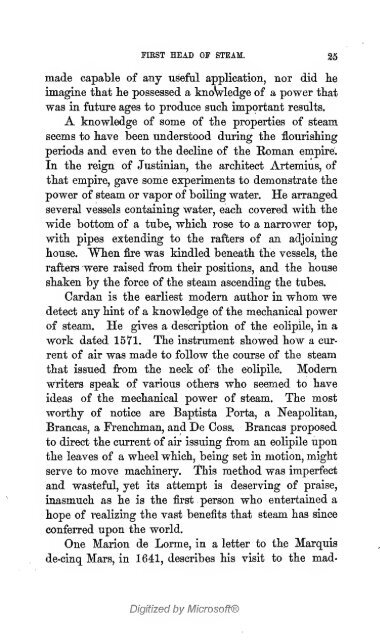The history of the first locomotives in America. From original ...
The history of the first locomotives in America. From original ...
The history of the first locomotives in America. From original ...
You also want an ePaper? Increase the reach of your titles
YUMPU automatically turns print PDFs into web optimized ePapers that Google loves.
FIRST HEAD OF STEAM. 25<br />
made capaWe <strong>of</strong> any usefal application, nor did he<br />
imag<strong>in</strong>e that he possessed a knoWledge <strong>of</strong> a power that<br />
was <strong>in</strong> future ages to produce such important results.<br />
A knowledge <strong>of</strong> some <strong>of</strong> <strong>the</strong> properties <strong>of</strong> steam<br />
seems to have been understood dur<strong>in</strong>g <strong>the</strong> flourish<strong>in</strong>g<br />
periods and even to <strong>the</strong> decl<strong>in</strong>e <strong>of</strong> <strong>the</strong> Koman empire.<br />
In <strong>the</strong> reign <strong>of</strong> Just<strong>in</strong>ian, <strong>the</strong> architect Artemius, <strong>of</strong><br />
that empire, gave sonie experiments to demonstrate <strong>the</strong><br />
power <strong>of</strong> steam or vapor <strong>of</strong> boil<strong>in</strong>g water. He arranged<br />
several vessels conta<strong>in</strong><strong>in</strong>g water, each covered with <strong>the</strong><br />
wide bottom <strong>of</strong> a tube, which rose to a narrower top,<br />
with pipes extend<strong>in</strong>g to <strong>the</strong> rafters <strong>of</strong> an adjo<strong>in</strong><strong>in</strong>g<br />
house. "When fire was Mndled beneath <strong>the</strong> vessels, <strong>the</strong><br />
rafters were raised from <strong>the</strong>ir positions, and <strong>the</strong> house<br />
shaken by <strong>the</strong> force <strong>of</strong> <strong>the</strong> steam ascend<strong>in</strong>g <strong>the</strong> tubes.<br />
Cardan is <strong>the</strong> earliest modern author <strong>in</strong> whom we<br />
detect any h<strong>in</strong>t <strong>of</strong> a knowledge <strong>of</strong> <strong>the</strong> mechanical power<br />
<strong>of</strong> steam. He gives a description <strong>of</strong> <strong>the</strong> eolipile, <strong>in</strong> a<br />
work dated 1571. <strong>The</strong> <strong>in</strong>strument showed how a cur-<br />
rent <strong>of</strong> air was made to follow <strong>the</strong> course <strong>of</strong> <strong>the</strong> steam<br />
that issued from <strong>the</strong> neck <strong>of</strong> <strong>the</strong> eolipile. Modern<br />
writers speak <strong>of</strong> various o<strong>the</strong>rs who seemed to have<br />
ideas <strong>of</strong> <strong>the</strong> mechanical power <strong>of</strong> steam. <strong>The</strong> most<br />
worthy <strong>of</strong> notice are Baptista Porta, a Neapolitan,<br />
Brancas, a Frenchman, and De Coss. Brancas proposed<br />
to direct <strong>the</strong> current <strong>of</strong> air issu<strong>in</strong>g from an eolipile upon<br />
<strong>the</strong> leaves <strong>of</strong> a wheel which, be<strong>in</strong>g set <strong>in</strong> motion, might<br />
serve to move mach<strong>in</strong>ery. This method was imperfect<br />
and wasteful, yet its attempt is deserv<strong>in</strong>g <strong>of</strong> praise,<br />
<strong>in</strong>asmuch as he is <strong>the</strong> <strong>first</strong> person who enterta<strong>in</strong>ed a<br />
hope <strong>of</strong> realiz<strong>in</strong>g <strong>the</strong> vast benefits that steam has s<strong>in</strong>ce<br />
conferred upon <strong>the</strong> world.<br />
One Marion de Lorme, <strong>in</strong> a letter to <strong>the</strong> Marquis<br />
de-c<strong>in</strong>q Mars, <strong>in</strong> 1641, describes his visit to <strong>the</strong> mad-<br />
Digitized by Micros<strong>of</strong>t®
















